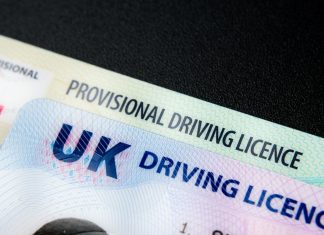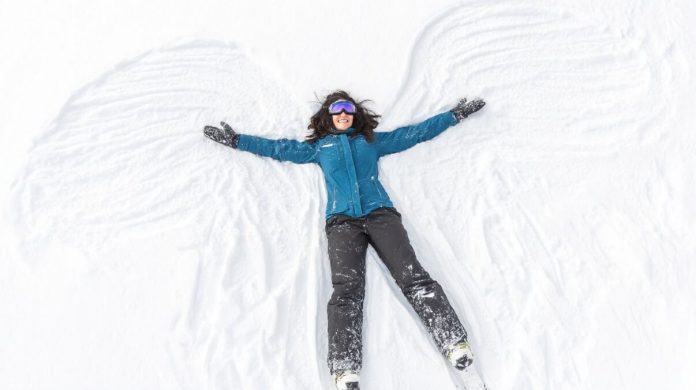
Last Updated on 20th May 2025
Hi, my name is Gwen and I have terrible balance and had a particularly embarrassing school ski trip when I was 17. Because of this I have avoided offers for a ski holiday ever since. I finally relented and took the plunge, and now I need to tell everyone about it. Approximately 1.5 million British skiers and snowboarders taking to the mountains annually, and this is for good reason. The idea of ski holidays often brings images of exhilarating slopes and cosy evenings, but is it the right type of getaway for a first-timer?
As well as tons of individuals returning, this winter experience attracts newcomers looking for adventure besides traditional beach getaways. Before booking that alpine escape, here’s what potential first-timers should consider.
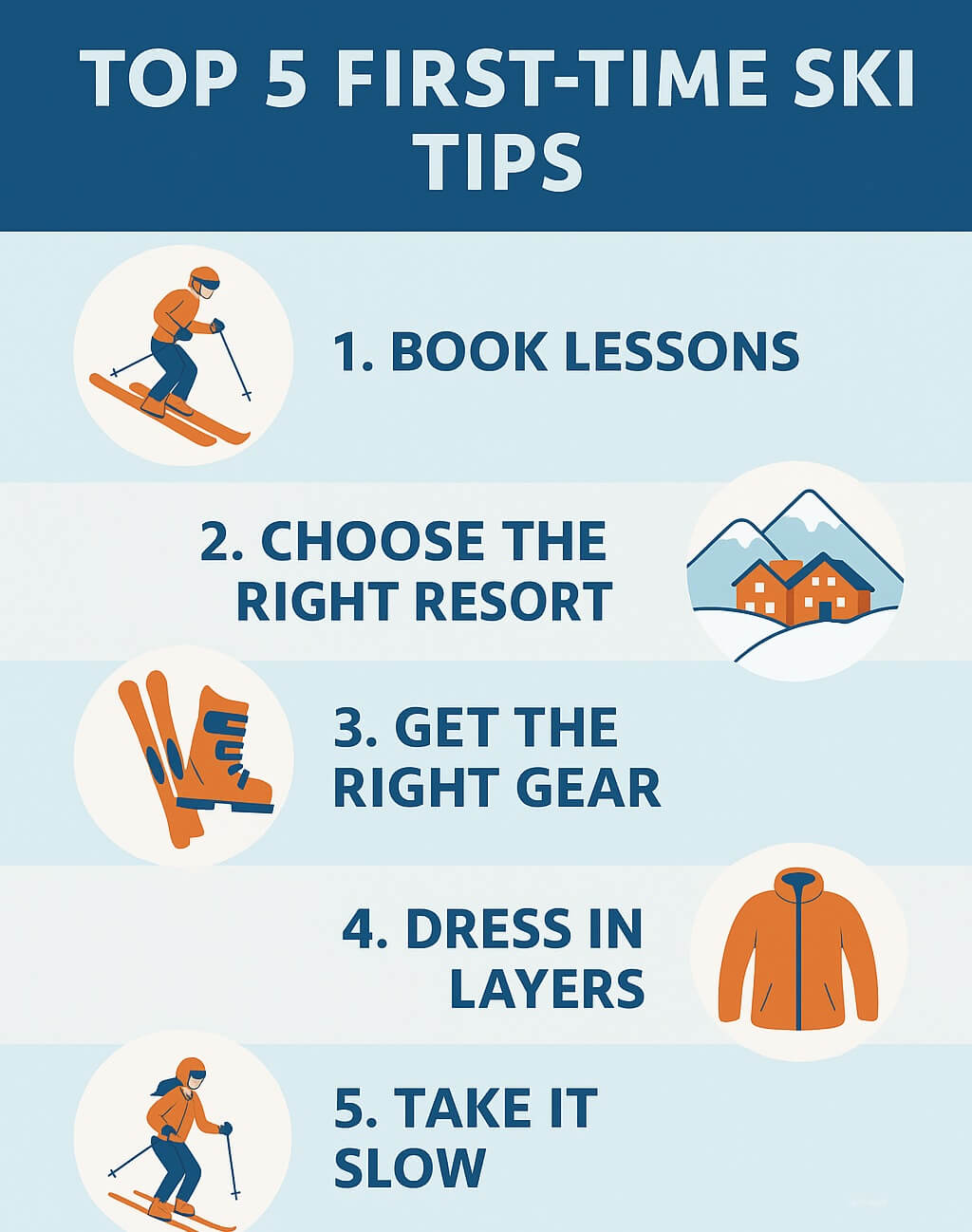
What’s the Appeal? Understanding the Draw of Skiing and Snowboarding
Winter sports holidays have a distinctive combination of physical activity, natural beauty, and social experience unmatched by other vacation styles. The majority of holidaymakers state that the combination of outdoor exercise and stunning scenery is their primary motivation, followed by the unique social atmosphere found in mountain ski resorts. I agree, the views are stunning, and once you get the hang of feeling in control on the ski’s it’s amazing.
The endorphin release from skiing creates what enthusiasts call a “mountain high”, a natural euphoria combining physical exertion with fresh mountain air. This psychological benefit explains why ski holidays show an amazing return rate, with first-timers frequently becoming lifelong enthusiasts despite initial challenges.
Addressing the Concerns: Cost, Fitness, and the Learning Curve
Cost is still the primary concern for first-timers, with the perception that winter sports vacations need substantial investment. While complete packages including equipment rental and lessons typically start around £800-£1,000 per person for a week depending on accommodation. Budget-conscious alternatives exist if you are happy with hotels over fancy chalet lodging.
Considering less-famous resorts, travelling during early or late season, or choosing package deals can lower costs. Fitness concerns often deter potential skiers, yet basic skiing needs more balance and coordination than cardiovascular endurance.
Most beginners start with gentle slopes requiring minimal athletic ability, with stamina building naturally through progressive lessons. Pre-holiday preparation should focus on core strength and leg exercises instead of extensive aerobic training.
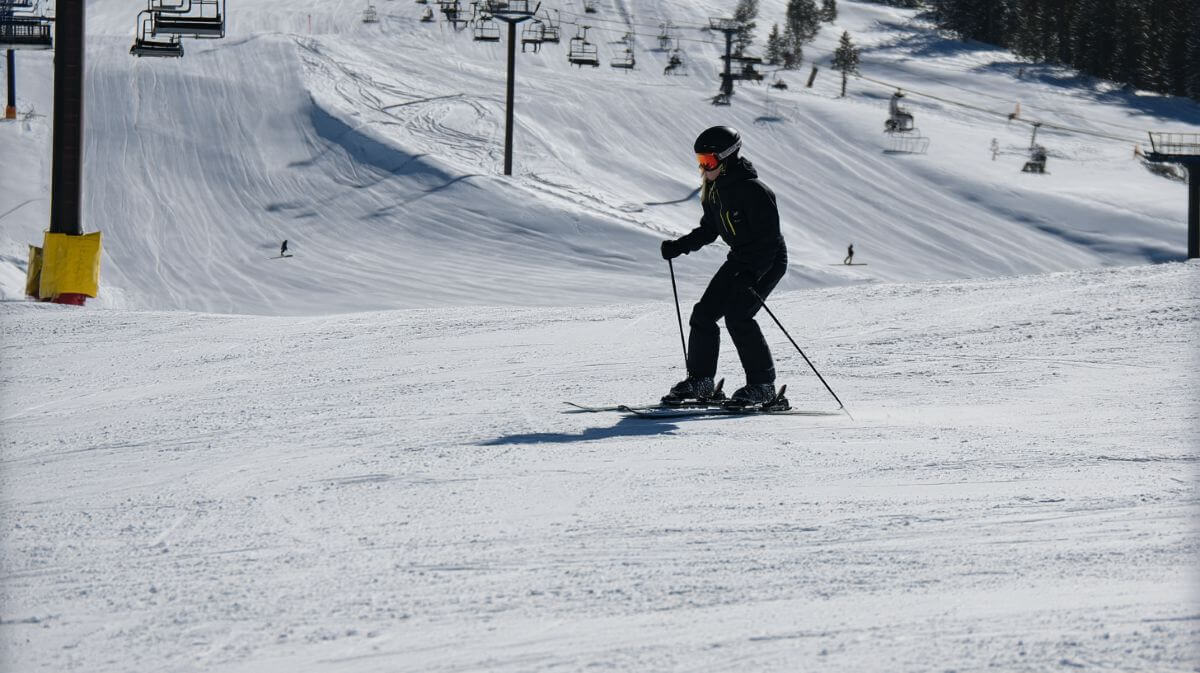
What to Expect: A Realistic Picture of a First Ski Holiday
First-time skiers usually spend mornings in lessons (usually 2-3 hours) followed by afternoon practice on beginner slopes. Initial days focus on fundamental skills like stopping and turning on easy terrain before progressively advancing to longer, more varied runs.
Most first-timers can comfortably go through easy green runs by their third or fourth day. The learning curve varies considerably between individuals, with most achieving independent skiing on beginner slopes within 3-4 days.
Snowboarding typically involves a steeper initial learning curve with more frequent falls but usually provides faster progression once basics are mastered.
Choosing the Right Destination: Beginner-Friendly Resorts and Lessons
Resort selection impacts first-time experiences. Ideal beginner destinations feature:
- Extensive nursery slopes separate from main thoroughfares
- Modern lift systems with conveyor belts for novices
- Reputable ski schools with English-speaking instructors
- Gentle progression from nursery slopes to easy green and blue runs
Popular beginner-friendly European destinations include Avoriaz (France), Obergurgl (Austria), and Livigno (Italy), which have a combination of excellent learning facilities with attractive village atmospheres. Group lessons typically cost £150-£250 for a five-day programme, while private instruction offers faster progression at approximately three times the price.
I highly recommend getting an instructor if you are nervous, and I found the modern method of Terrain Based Learning to be ideal. They also give you important information and safety tips your friends may forget.
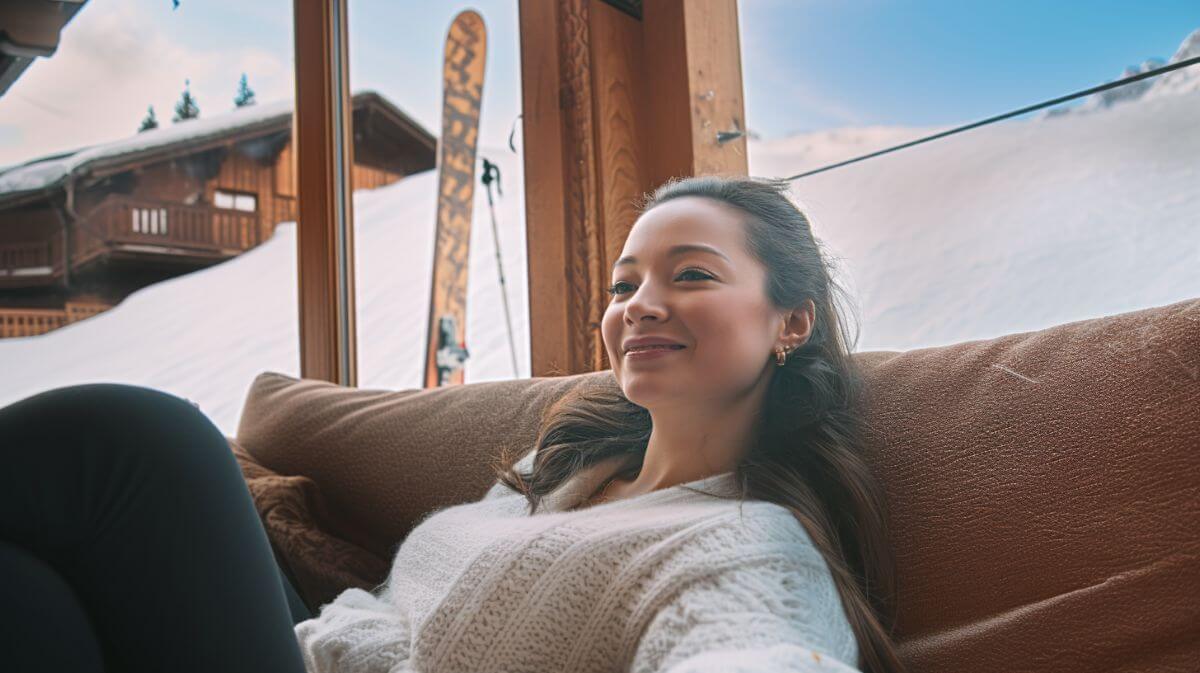
First-Time Skiing: Do’s & Don’ts
| ✅ Do’s | 🚫 Don’ts |
|---|---|
| Take at least one professional lesson on your first day. | Don’t rely on friends to teach you, it can lead to poor habits and frustration. |
| Wear one pair of tall, thin ski-specific socks. | Don’t double up socks or tuck anything (leggings, pants) into your boots. |
| Dress in breathable, waterproof layers. | Don’t wear cotton or overly thick layers, you’ll sweat and get cold. |
| Keep your body relaxed and knees slightly bent. | Don’t tense up or lean back, it increases your chances of falling. |
| Practice safe falling and getting up. | Don’t try to stop yourself mid-fall, relax and roll with it. |
| Start on beginner slopes and progress gradually. | Don’t let others pressure you onto harder runs before you’re ready. |
| Check your boot fit before hitting the slopes. | Don’t ignore discomfort, it can ruin your day or cause injury. |
| Take regular breaks, hydrate, and eat. | Don’t push through exhaustion, skiing is physically demanding. |
| Apply sunscreen and wear eye protection. | Don’t underestimate the sun at altitude, snow reflects UV light. |
| Keep a positive mindset and have fun. | Don’t stress if you’re not a pro on day one, everyone starts somewhere. |
Practical Tips for First-Time Skiers
Before You Hit the Slopes
- Watch beginner tutorials online: Channels like Deb Armstrong’s (ex-Olympian) are great primers.
- Train your core and legs: Light pre-trip workouts will improve stamina and recovery.
- Bring hand warmers, sunscreen, and lip balm: Windburn and sunburn are real threats on the slopes.
- Accept you will fall: Embrace it! Most beginner falls are soft. Relax your body to avoid injury.
- Don’t rush to harder runs: Stay on bunny slopes or greens until you’re confident stopping and turning. It really doesn’t matter that small children will zoom past you, they have a low centre of gravity which improves control and reduces falls.
Mindset & Confidence
It’s normal to feel overwhelmed, Skiing uses unfamiliar movements; improvement takes a few days. Skiing is not intuitive and learning the technique takes time. So take breaks, enjoy the views, and don’t compare yourself to others. Progress is non-linear and deeply personal so focus on your own journey.
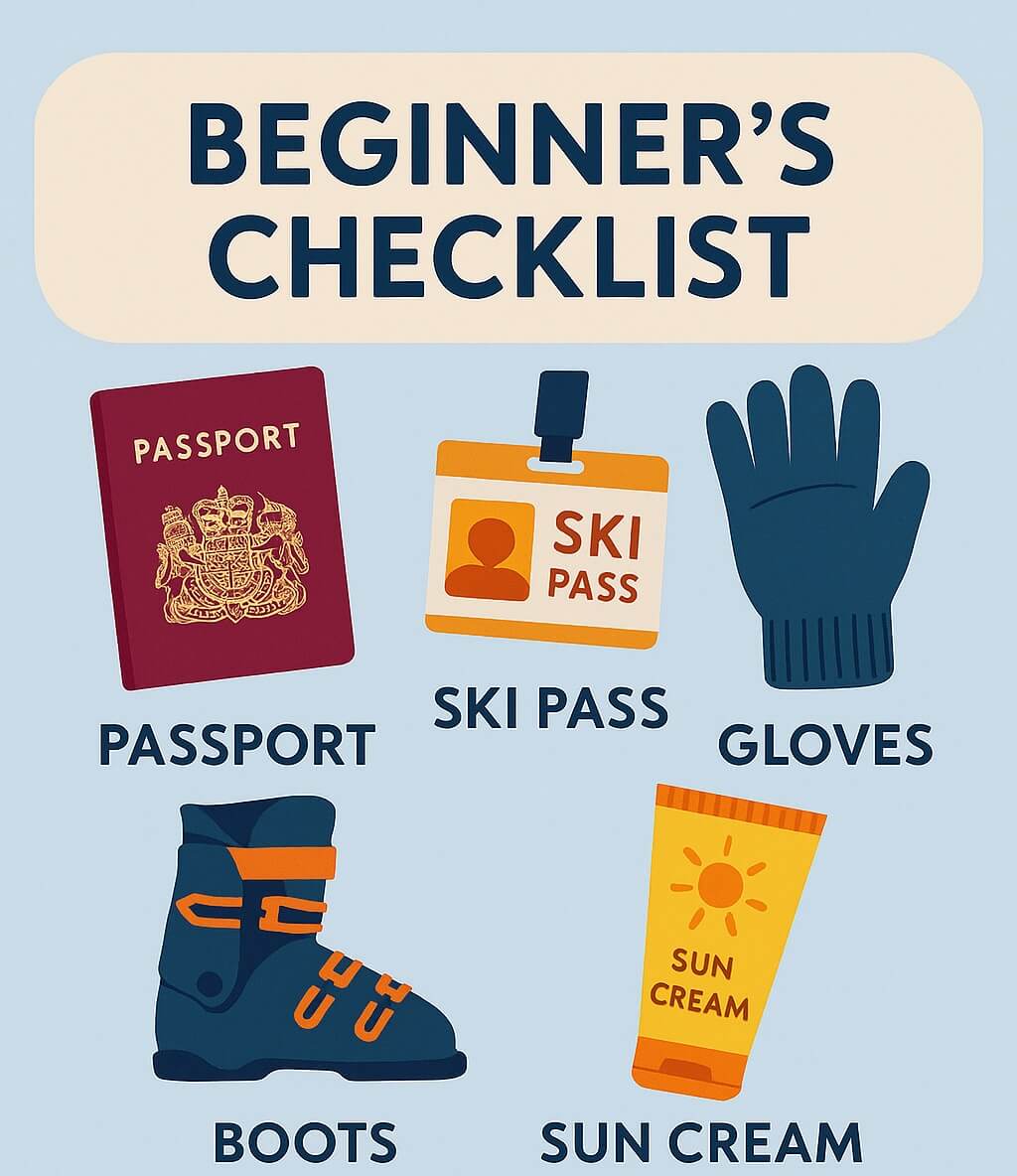
UK Travel Logistics: What First-Timers Should Know
Planning your first ski holiday from the UK involves a few practical considerations to ensure a smooth and stress-free trip.
Travel Times & Transport Options
- Flights from major UK airports (London Gatwick, Manchester, Birmingham, Edinburgh) reach popular ski destinations like Geneva, Innsbruck, and Turin in 1.5 to 2.5 hours.
- Transfer times from airport to resort can range from 45 minutes to 3 hours, depending on location. Resorts like Avoriaz or Morzine (France) are popular for their quick transfer from Geneva.
- Self-driving is possible, especially to the French Alps. Consider the Eurotunnel or ferry to France and prepare for alpine driving (snow chains, insurance, and tolls).
UK-Based Gear Rental & Retail
Renting ski equipment in the UK before travel is an option for convenience and cost control. Companies like Ski Togs, Snow+Rock, and Ellis Brigham offer short-term hire for skis, boots, and helmets. It’s worth asking experienced friends to borrow a good jacket, poles, goggles and helmet which are easily packable.
Alternatively, most resorts provide on-site rental, which can be more convenient for fitting adjustments, though occasionally pricier.
Winter Sports Travel Insurance
Standard travel insurance usually doesn’t cover skiing, you’ll need a policy that includes winter sports.
Look for cover that includes:
- Off-piste skiing (if applicable)
- Equipment loss/damage
- Medical evacuation from ski slopes
- Unused ski pass refunds due to injury or resort closure
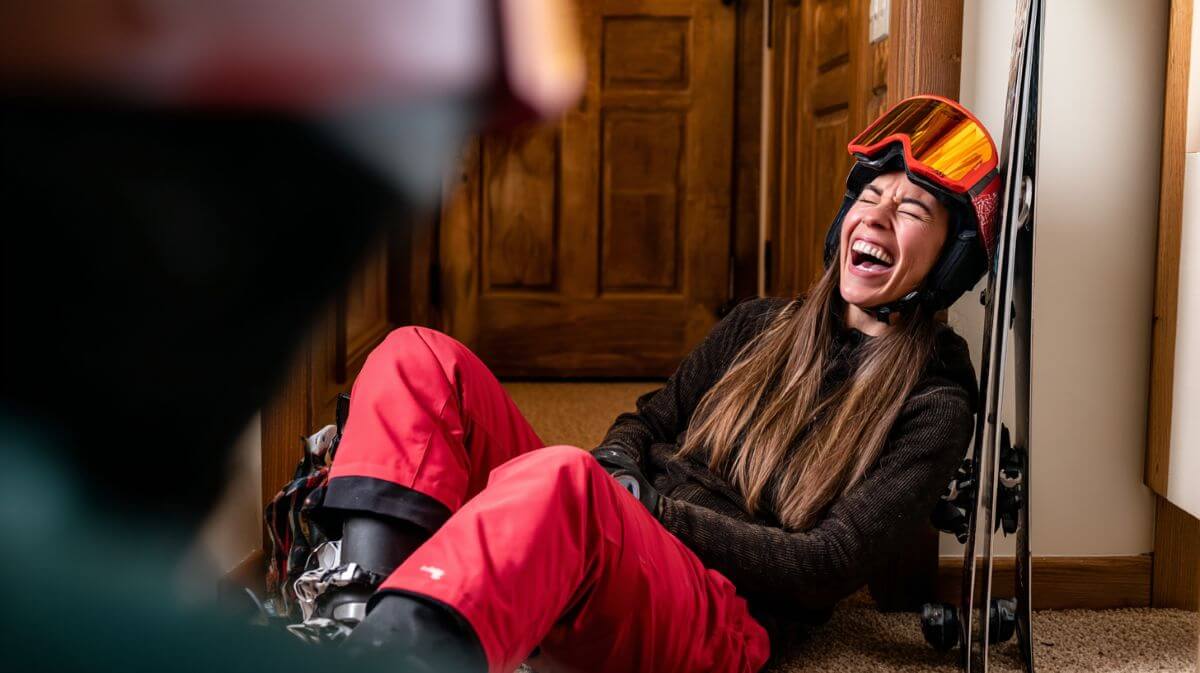
Last Tips:
- Book ski passes online in advance for discounted prices.
- Pack layers, sunscreen, and a ski-specific face covering or balaclava for cold or windy days.
- Most airlines include ski equipment as part of your baggage allowance, but check your fare rules carefully.
For those considering their first winter sports adventure, the combination of physical challenge, breath-taking scenery, and mountain culture offers a refreshing alternative to conventional holidays, giving experiences and memories distinctly different from standard vacation options.


























